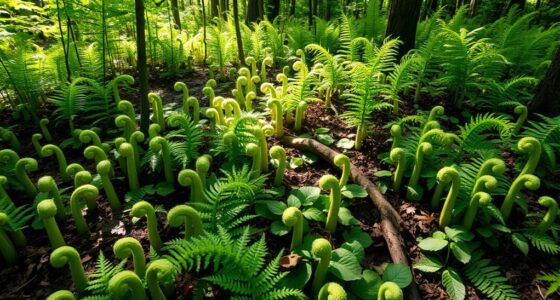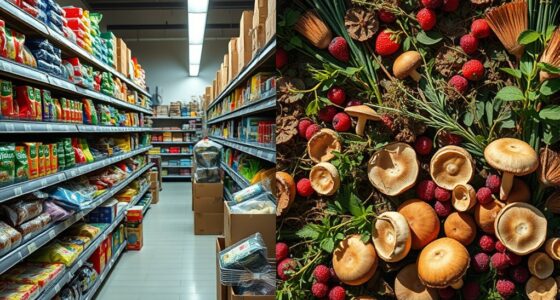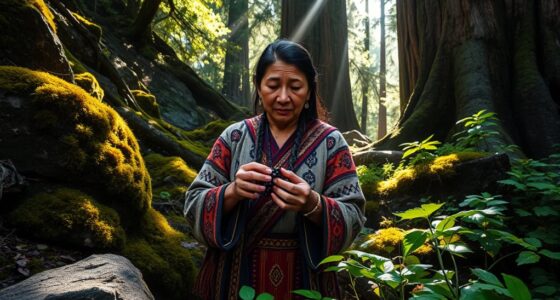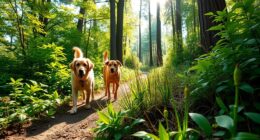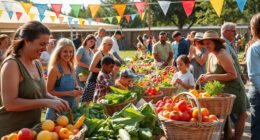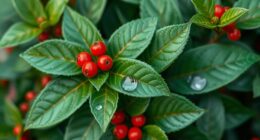To protect your local foraging rights, start by understanding the rules and regulations, including permits and restrictions, through official city or land management sources. Build community support by organizing workshops, festivals, and sharing knowledge via social media. collaborate with local authorities and conservation groups to advocate for sustainable policies. Practice responsible harvesting, document your efforts, and communicate your experiences effectively. If you keep exploring, you’ll find even more ways to strengthen your foraging rights and community impact.
Key Takeaways
- Engage with local authorities and conservation groups to advocate for policies supporting responsible urban foraging.
- Educate the community on foraging regulations, sustainable practices, and the importance of protecting native plants.
- Organize or participate in workshops, festivals, and awareness campaigns to build community support.
- Document foraging activities with detailed records and share findings to demonstrate positive impacts.
- Persistently lobby policymakers for legal protections and incorporate community input to influence legislation.
Understanding Your Local Foraging Regulations
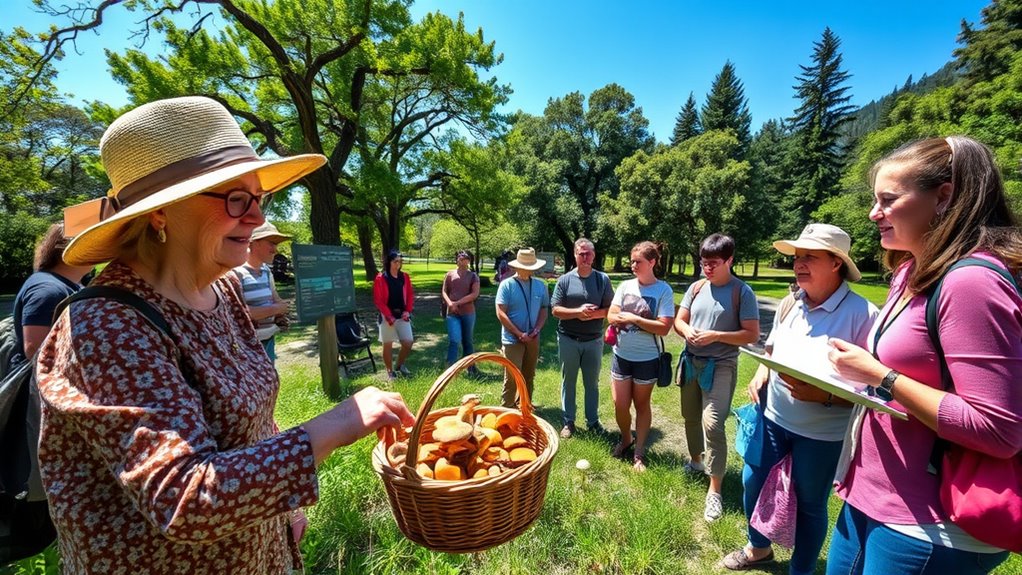
Understanding your local foraging regulations is essential before harvesting wild plants in your area. Check if you need foraging permits or if there are restrictions in place. Many local ordinances specify where and when you can gather plants, helping you avoid fines or legal trouble. Some regions limit foraging to certain species or require permission from landowners. It’s your responsibility to research these rules beforehand. Visit your city or county’s official website or contact local agencies to get accurate, up-to-date information. Knowing and respecting these regulations ensures you forage responsibly, preserving the environment and maintaining good community relationships. Ignoring local ordinances not only risks penalties but also jeopardizes the sustainability of wild plant populations. Staying informed about foraging regulations and advocating effectively for your foraging rights can make a significant difference.
Building Awareness and Community Support
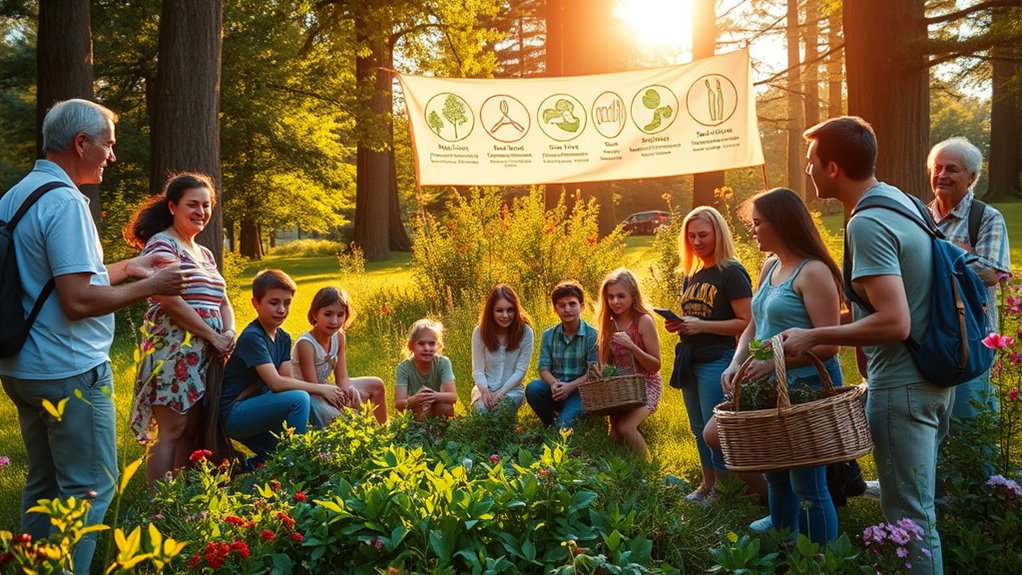
Routinely building awareness and garnering community support are essential steps in advocating for responsible foraging. You can do this by promoting urban foraging as a sustainable practice and sharing success stories at local foraging festivals. Engaging your community helps dispel myths and highlights the benefits of responsible foraging. To catch attention, consider:
- Organizing or participating in foraging festivals to showcase safe practices
- Creating educational materials about local edible plants
- Using social media to share foraging tips and success stories
- Emphasizing the importance of measuring success in community initiatives to track progress and adapt strategies effectively
These efforts foster a sense of shared responsibility and encourage others to get involved. When the community understands and values urban foraging, it strengthens your advocacy efforts and helps protect foraging rights for everyone.
Collaborating With Local Authorities and Conservation Groups
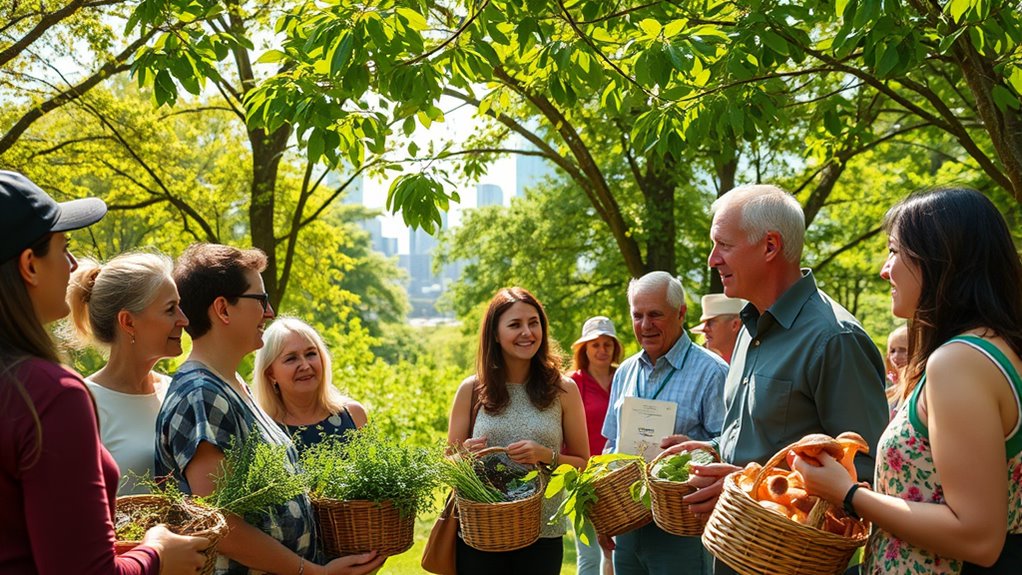
Partnering with local authorities and conservation groups can substantially enhance your urban foraging efforts. By working with these entities, you gain access to valuable resources and support that help protect your foraging rights. Authorities often have valuable insights into local regulations and conservation priorities, which can inform your activities and guarantee compliance. Conservation groups, meanwhile, bring traditional knowledge about native plants and sustainable harvesting methods. Collaborating with them allows you to share expertise, stay informed about environmental concerns, and advocate for policies that support responsible urban foraging. Building these relationships strengthens your community’s voice, encourages sustainable practices, and helps ensure that foraging remains a viable activity for future generations. Together, you can promote a balanced approach to urban foraging and conservation. Utilizing innovative gardening tools like unique planters and eco-friendly watering systems can further support sustainable practices.
Practicing Responsible and Sustainable Foraging

Building strong partnerships with local authorities and conservation groups lays a solid foundation for practicing responsible and sustainable foraging. To uphold harvest ethics and maintain ecosystem balance, you should follow key principles:
- Only harvest what you need, avoiding overharvesting
- Identify and respect protected species and habitats
- Leave enough behind for the environment to thrive
- Stay informed about foraging guidelines and local regulations to ensure compliance and conservation efforts.
Documenting and Sharing Your Foraging Activities
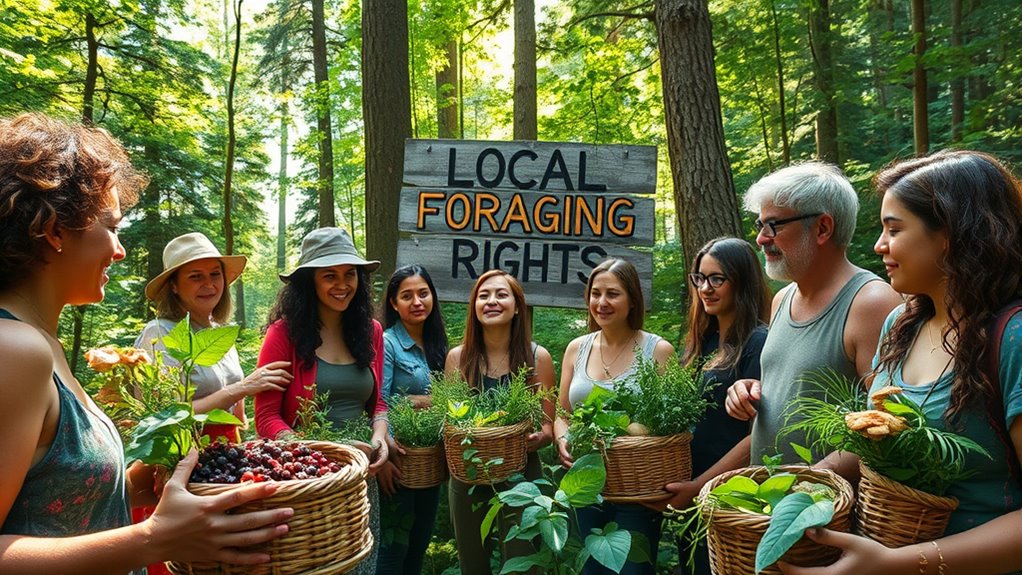
Recording your foraging journeys helps you track your progress and learn from your experiences. Sharing your findings on social platforms can inspire others and build a community of responsible foragers. How you document and share can amplify your impact as a citizen advocate for sustainable foraging. Engaging with celebrity lifestyle insights can also provide creative ideas for showcasing your foraging adventures.
Recording Foraging Journeys
Capturing your foraging adventures not only preserves memories but also helps you track your progress and discoveries over time. When recording your journeys, focus on your foraging gear, safety protocols, and key observations. Consider keeping a journal or digital log to note location, date, weather, and plant details. Use a camera or smartphone to photograph your finds, ensuring clear images of identification features. Remember to follow safety protocols, such as wearing gloves and verifying plant species before harvesting. To make your records engaging and useful, include:
- Detailed photos of plants and habitats
- Notes on foraging conditions and safety tips
- GPS coordinates or maps of foraging spots
- Awareness of local laws and regulations related to foraging activities
These practices ensure you build a valuable record, support safe foraging, and strengthen your advocacy efforts.
Sharing Through Social Platforms
Sharing your foraging activities on social platforms allows you to inspire others, showcase your discoveries, and connect with a community of enthusiasts. By posting photos and stories, you can spark interest and encourage more people to explore local foraging rights. To maximize impact, use effective social media strategies like engaging captions, relevant hashtags, and engaging visuals. Consider crafting viral campaigns that highlight the importance of preserving foraging access and sustainable practices. Sharing regularly helps build awareness and positions you as a knowledgeable advocate. Remember, authenticity matters—share your genuine experiences and insights. This not only fosters trust but also amplifies your message, encouraging others to join the movement and protect local foraging rights through collective online action. Additionally, understanding the local laws and regulations is essential to ensure that your foraging activities remain legal and respectful of community guidelines.
Advocating for Policy Changes and Legal Protections
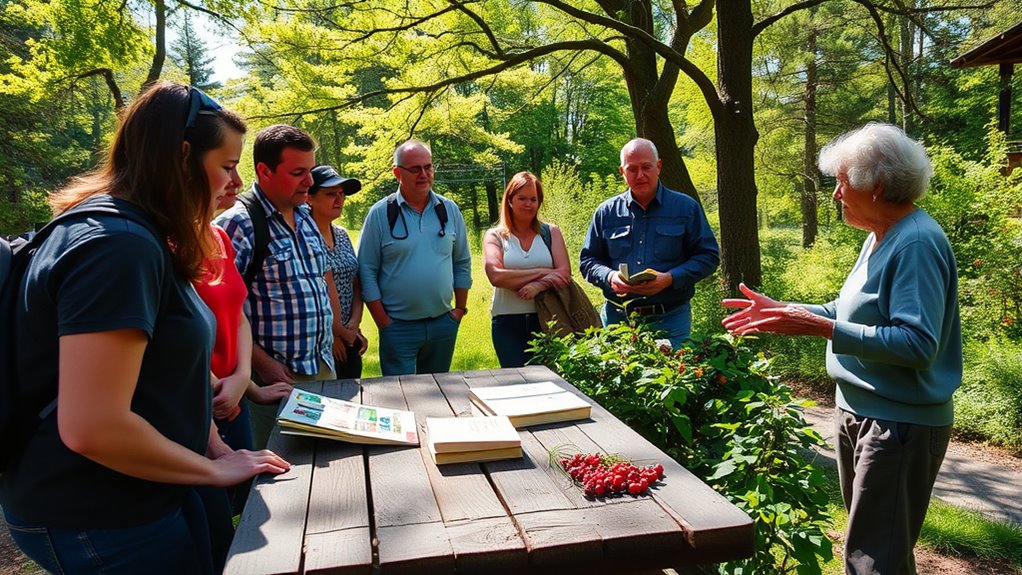
You can influence change by actively lobbying for new laws and policies that protect your community’s interests. Building strong support from others makes your efforts more impactful and gains momentum. Together, your collective voice can push for meaningful legal protections that benefit everyone. Incorporating practical tips on community engagement can further strengthen your advocacy efforts.
Lobbying for Legislation
Lobbying for legislation is a crucial way citizens can influence public policy and guarantee their voices are heard by decision-makers. Your efforts can lead to meaningful policy amendments that protect foraging rights and promote sustainable practices. To succeed, focus on:
- Building relationships with lawmakers through direct communication
- Organizing grassroots initiatives to demonstrate community support
- Providing clear, evidence-based arguments to strengthen your case
Engaging in these activities helps lawmakers understand the importance of your cause and encourages them to champion legal protections. Your advocacy can shape laws that preserve local foraging traditions and ensure access for future generations. Remember, persistent and well-organized lobbying makes a difference in turning community voices into policy changes. Your involvement is vital for securing lasting legal protections. Incorporating nutrient-rich ingredients into community initiatives can further support sustainable practices and community health.
Building Community Support
Building strong community support is a powerful way to amplify your advocacy for policy changes and legal protections. When neighbors understand the benefits of urban foraging and edible plant education, they’re more likely to back your efforts. Organize local events, share knowledge, and foster conversations about sustainable foraging practices. Use the table below to identify key community stakeholders and strategies:
| Stakeholder | Role | Strategy |
|---|---|---|
| Local Residents | Support for urban foraging | Host workshops and educational talks |
| Community Groups | Advocacy and outreach | Collaborate on awareness campaigns |
| Policy Makers | Implement protections | Present data on edible plant benefits |
Engaging these groups builds momentum and creates a unified voice for protecting your foraging rights. Additionally, understanding contrast ratio can help in creating visual materials that effectively communicate your message during outreach events.
Frequently Asked Questions
How Can I Identify Which Plants Are Safe to Forage Locally?
To identify which plants are safe to forage locally, focus on plant identification skills. Learn to recognize edible species and distinguish them from look-alikes through reliable field guides or apps. Always double-check your findings, and start with well-known, safe plants. Prioritize foraging safety by consulting local experts or wild food courses. Remember, proper plant identification is key to enjoying foraging while avoiding toxic or harmful plants.
Are There Any Financial Benefits to Advocating for Foraging Rights?
Ah, the days of chivalry and community spirit! By advocating for foraging rights, you might uncover financial benefits through community funding and grant opportunities aimed at conservation and sustainable practices. Your efforts can attract local support, potentially leading to grants that fund education programs or urban foraging initiatives. These resources empower you and your community, turning your advocacy into a smart investment that benefits everyone’s access to nature’s bounty.
What Are Common Challenges Faced by Citizen Advocates in This Area?
You’ll often face community resistance when advocating for local foraging rights, as some residents worry about overharvesting or environmental impacts. Resource limitations, like limited time, funding, or access to legal expertise, also pose challenges. These obstacles make it harder to build consensus and develop effective strategies. Staying persistent, engaging with community members openly, and seeking partnerships can help you overcome resistance and resource constraints to protect foraging rights.
How Can Technology Assist in Monitoring Local Foraging Areas?
Technology plays a essential role in monitoring local foraging areas. You can use drone surveillance to get real-time aerial views, helping you spot illegal harvesting or habitat damage quickly. Mobile apps also empower you to document and report concerns, share data with other advocates, and track changes over time. Together, these tools enhance your ability to protect foraging spots, ensuring they remain accessible and healthy for future generations.
What Legal Consequences Exist for Unauthorized Foraging?
You should know that unauthorized foraging can lead to serious legal penalties, including fines or even criminal charges. Compliance regulations are strict in many areas to protect local ecosystems and public safety. If you ignore these rules, you risk losing access to foraging spots and facing legal action. Always research local laws before foraging, and respect restrictions to avoid penalties and help preserve natural resources.
Conclusion
Just like Robin Hood championed the people’s right to what was theirs, you have the power to safeguard your community’s foraging rights. By staying informed, working with local groups, and advocating for responsible practices, you guarantee these natural resources remain accessible for generations. Remember, the forest’s bounty isn’t just for today—it’s a legacy, much like the enduring stories of those who fought for justice. Your actions today can carve a path toward sustainable foraging tomorrow.




